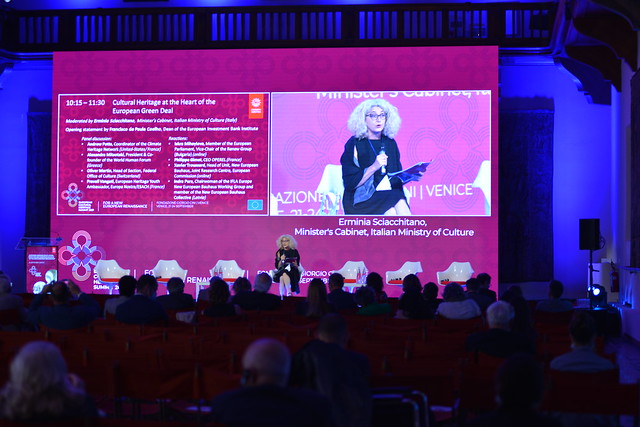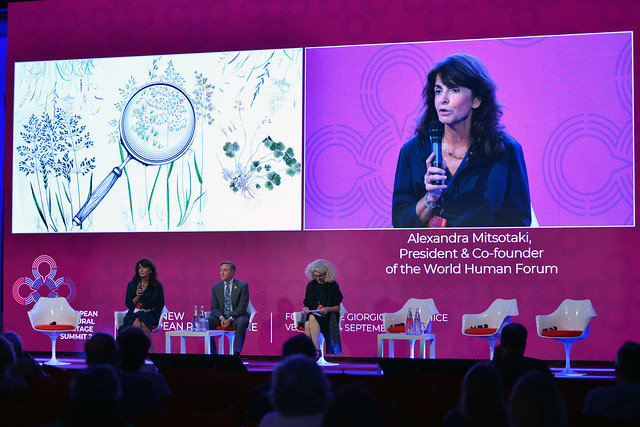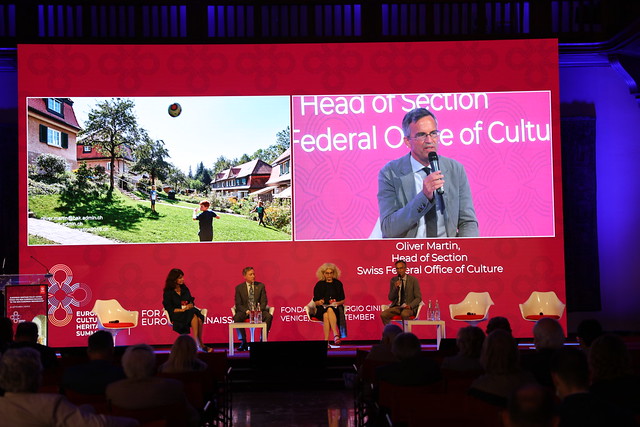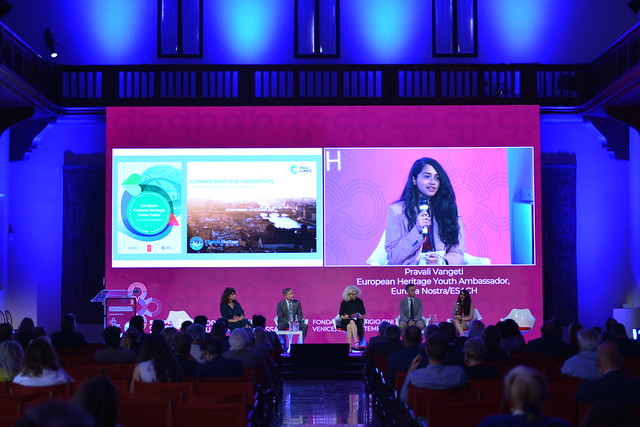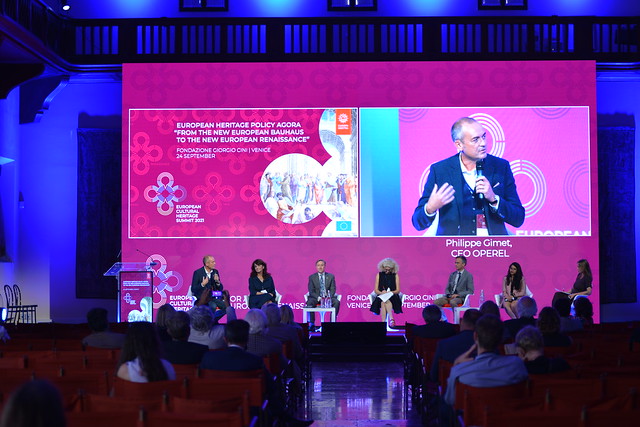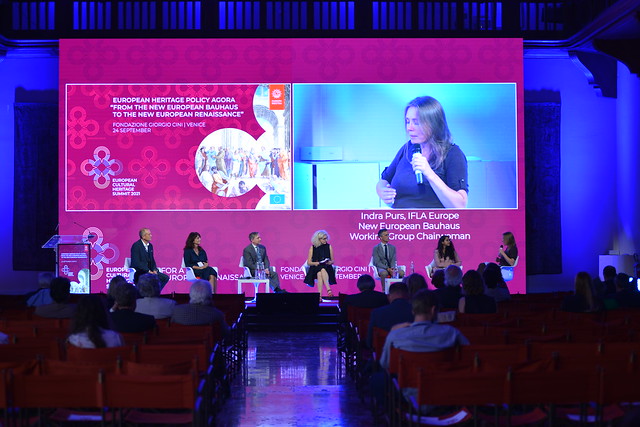European Heritage Policy Agora – Panel “Cultural Heritage at the heart of the European Green Deal”
The European Heritage Policy Agora “From the New European Bauhaus to the New European Renaissance” was one of the highlights as well as the closing event of the European Cultural Heritage Summit 2021 held from 21-24 September in Venice. The Policy Agora brought together policy-makers at all levels of governance and key heritage stakeholders to reflect on the most topical issues for the cultural heritage ecosystem in Europe, including, among others, the European Green Deal and the New European Bauhaus, the role of cultural heritage in the EU’s external relations and the Conference on the Future of Europe (read the main news item about the Policy Agora).
The first panel discussion entitled “Cultural Heritage at the heart of the European Green Deal” deepened the conclusions and recommendations introduced by the pioneering European Cultural Heritage Green Paper “Putting Europe’s shared heritage at the heart of the European Green Deal”, produced by Europa Nostra in cooperation with ICOMOS and the Climate Heritage Network, with the input of members of the European Heritage Alliance and with the support of the European Investment Bank Institute. It addressed the role and potential of cultural heritage for the success of the European Green Deal and the need to create synergies between relevant European policies and actions related to the built environment and the green renovation wave.
The panel was moderated by Erminia Sciacchitano, from the Cabinet of the Italian Minister of Culture, and introduced by Francisco de Paula Coelho, Dean of the European Investment Bank Institute, who emphasised: “Climate change is the greatest threat for the new generations. The European Union and its citizens must reduce carbon dioxide emissions by 55% over the next ten years, radically changing their way of life”.
Andrew Potts, Coordinator of the Climate Heritage Network, reminded that the European Cultural Heritage Green Paper provides a relevant framework for the climate action mobilisation ahead of the 26th UN Climate Change Conference of the Parties (COP26) taking place in Glasgow on 31 October – 12 November 2021. “Culture counts for climate action – when it comes to the climate emergency, the world can count cultural heritage in!”, he stressed.
Alexandra Mitsotaki, President and Co-founder of the World Human Forum as well as member of the New European Bauhaus High-Level Roundtable, stated: “Out of the 3 words characterising the New European Bauhaus, the most important one is “together” because we often forget that the current crisis goes beyond climate change. It is a crisis of civilisation, of democracy and of our values.” She also highlighted that only a bottom-up approach to climate action can make a real difference.
Oliver Martin, Head of Section of the Swiss Federal Office of Culture, recalled the principles laid out in the Davos Declaration “Towards a high-quality Baukultur for Europe” adopted in January 2018 by the European Ministers of Culture as well as in the Davos Baukultur Quality System published in May 2021. “Heritage offers solutions to counter the dramatic effects of consumerism. Sustainable means of transport, local products and traditional materials are heritage and historical concepts we should embrace,” he affirmed.
Pravali Vangeti, member of the European Heritage Youth Ambassador joint programme of Europa Nostra and ESACH, presented the online events “Climate Heritage Narratives: Youth-led intergenerational dialogues” organised in the frame of the Pre-COP26 meetings in Italy. “Young people are listening – but also acting! This event is designed and led by youth, and so will be the follow-up actions,” she noted.
A series of reactions followed the panel discussion. Iskra Mihaylova, Member of the European Parliament and Vice-Chair of the Renew Group, reiterated the strong support of the European Parliament. “The cultural world is ready to contribute to the transformation of our society, towards a more beautiful, sustainable and inclusive one. For this, we must foster a dialogue between stakeholders at all levels and put cultural heritage at the heart of the European Green Deal”,she emphasised.
Philippe Gimet, CEO OPEREL, operator specialised in the new generations of cultural, tourist and event facilities, quoted the Secretary General of Europa Nostra: “Saying that cultural heritage is a sector is wrong. It is a vector and a starting point towards the future”. He further advanced that to untap the potential of cultural heritage for Europe, we must bring together financial actors, civil society and authorities at all levels.
Xavier Troussard, Head of Unit of the New European Bauhaus at the Joint Research Centre of the European Commission, reacted by pointing at a major challenge ahead of us: transforming the New European Bauhaus’ motto “beautiful, sustainable, together” into a practical utopia. He put forward that the cultural heritage world can play a major role in this difficult task.
At last, Indra Purs, Chairwoman of the IFLA Europe New European Bauhaus Working Group and member of the New European Bauhaus Collective, highlighted that both the concepts of time and circularity are embodied in cultural heritage. “Heritage can support mature, bold and humanised decisions. Not only human rights, but human-nature rights. The challenge is to ensure commitment to implement actions,” she stated.
At the end of the European Heritage Policy Agora, the Venice Call to Action: “For a New European Renaissance” was presented. The Venice Call to Action makes a strong plea to European leaders at all levels of governance as well as to all heritage actors to duly integrate the transformative power of culture and cultural heritage among the strategic priorities for the reshaping of our societies. It outlines a series of pressing challenges facing our continent – from the post-pandemic recovery to climate change – and stresses the vital positive contribution of culture and cultural heritage to successfully address them. The Venice Call to Action puts forward 12 concrete and actionable proposals – as a direct contribution by Europa Nostra and its network – that aim at unleashing the potential of cultural heritage for the European Green Deal, the New European Bauhaus and the forthcoming 2022 Year of European Youth, among other key priorities of the European Union, as well as the United Nations’ Sustainable Development Goals.
More information:
Read all the news items on the European Heritage Policy Agora.
Watch the full videos of the Policy Agora (part I and part II).
Read the Policy Agora Programme booklet. The programme booklet only exists in electronic version. Every unprinted booklet helps the environment.
